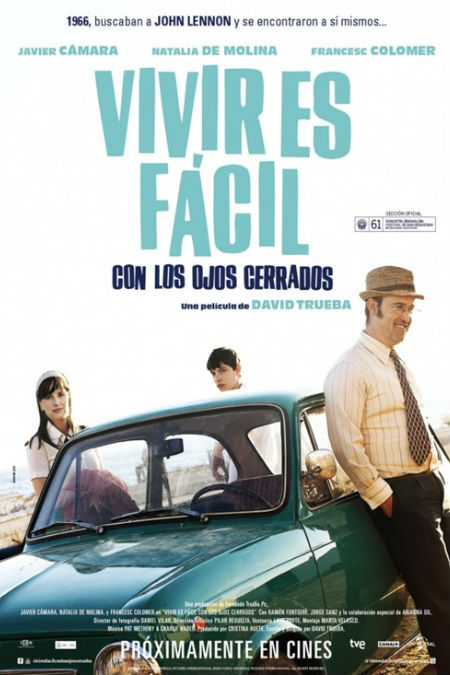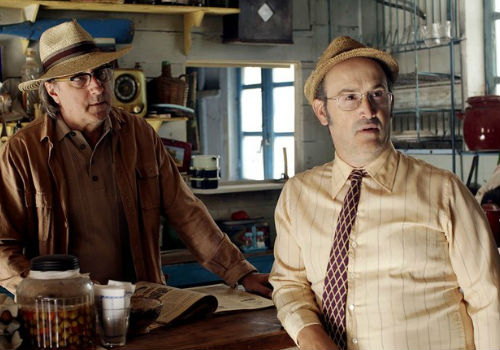
In this age of blockbusters, television events, and reality TV, it is to forget that not all the transformative events in life are writ large for all the world to see.
Many things, even the really important things, simply just happen, quietly and out of sight, and no one, besides the people directly involved, are ever any the wiser.
It is clearly something that Spanish director David Trueba understands all too well, infusing his comedy-drama Living Is Easy with Eyes Closed Vivir es fácil con los ojos cerrados) with an understated charm and grace that belies the great changes wrought in its characters’ lives.
A road trip movie of sorts set in 1966, it is essentially about one man’s quest – lonely English-Latin teacher and diehard Beatles fan Antonio (Javier Cámara in brilliantly nuanced form), based on a real man Juan Carrón Gañàn, who uses the songs of the band he loves, particularly those penned by his hero John Lennon such as “Help!”, to guide his lessons – to meet his musical hero who is filming How I Won the War in the seaside town of Almería in Spain.
A man who clearly longs for more in life but is a little afraid to pursue it, he decides in an uncharacteristically impromptu move to drive to the town one weekend, an act which though accompanied by a fear that if he is late returning he will be censured by his easily-angered boss, must be undertaken since he fears not meeting John Lennon even more.
On his way to the most important meeting of his life, one for which he has a prepared a speech which he is constantly and earnestly rehearsing, he picks up teenage mother Belén (Natalia de Molina), escaping from the cruelly over-protective clutches of Doña Mercedes (Celia Bermejo) and her prison-like home for unwed mothers, and Juanjo (Francesc Colomer), a teenage boy running away from home, largely, and impetuously, in protest at his domineering father’s (Jorge Sanz) attempts to cut his Beatles-esque hairdo.
All three come together in an unexpected temporary family of sorts, their arrival in Almería not so much the end of things – the original plan involved each person going their separate ways once there though neither Belén nor Juanjo knows what that is exactly – as the beginning of a journey within themselves which alters the trajectory of their lives, ostensibly for the better.

What is most appealing about Living Is Easy with Eyes Closed Vivir es fácil con los ojos cerrados), which draws its title from the first line of the John Lennon-penned Beatles’ song “Strawberry Fields Forever” which the singer-songwriter wrote while in Spain in tribute to a country he came to love, is that it never overplays its dramatic hand, embedding the clearly life-changing events within the slowly-unfurling, almost-Quixotic context of Antonio’s unwavering mission.
There is no blatant emotional telegraphing of emotional angst, though it is there in quietly expressed moments such as when Belén is told by a drunk Antonio that he could marry her if she would marry him, his reaching out from his loneliness greeted with an appreciative smile from a vulnerable woman with few options who seems to momentarily consider the proposal, nor overselling of each of the characters’ somewhat fraught personal positions.
Difficult, challenging and fearful though their places in the world might be at present, they are simply presented as part and parcel of the business of living, of coming to grips, for Belén and Juanjo particularly who are still figuring what life might look like and how to navigate it, with its unpredictability and frequent lack of firm answers to tough questions or clearly-marked signposts.
The larger context to the entire movie, though again this point is never belaboured, is that it all takes places in Franco’s Spain, a country where fear is a common currency, mostly for the young, and it is this fear that Antonio, a teacher to the last, does his best to remedy in the lives of his two young charges, stressing to them the need to fight your fears and go on in life anyway.
It is a lesson he heeds too at the end of the film when he finally, and it must be said, gleefully, confronts a man who has been bullying the local bar owner he has befriended Ramón (Ramon Fontserè) whose disabled son is treated as a surrogate younger brother by Juanjo who, like most teenagers finds himself at a loss once the initial source of his rebellion is exhausted.
Charming, understated and charged with quiet meaning, and life lessons that are naturally learnt in the course of one extraordinary week rather than artificially grafted onto the narrative in a clumsy attempt to emotionally manipulate an outcome, Living Is Easy with Eyes Closed Vivir es fácil con los ojos cerrados) is that rare cinematic beast – a heartfelt, moving film that, deftly directed by Trueba, is content to simply let events unfold with no guarantees of where they will ultimately lead, much like real life itself..